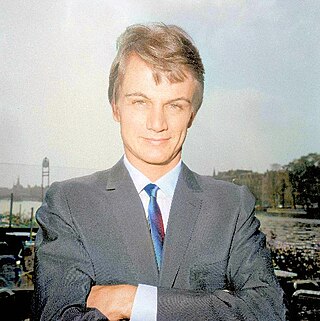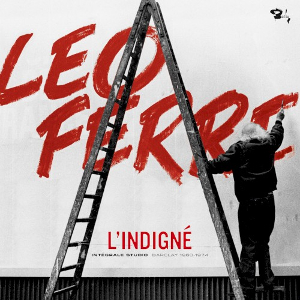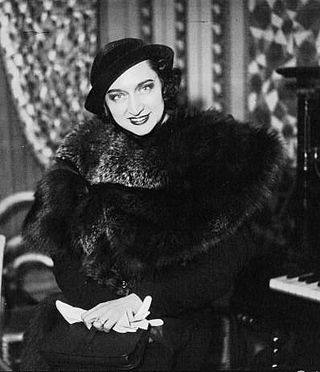Related Research Articles

Gilles Vigneault is a Canadian poet, publisher, singer-songwriter, and Quebec nationalist and sovereigntist. Two of his songs are considered by many to be Quebec's unofficial anthems: "Mon pays" and "Gens du pays", and his line Mon pays ce n'est pas un pays, c'est l'hiver became a proverb in Quebec. Vigneault is a Grand Officer of the National Order of Quebec, Knight of the Legion of Honour, and Officer of the Ordre des Arts et des Lettres.

Claude Antoine Marie François, also known by the nickname Cloclo, was a French pop singer, composer, songwriter, record producer, drummer and dancer. François co-wrote the lyrics of "Comme d'habitude", the original version of "My Way" and composed the music of "Parce que je t'aime mon enfant", the original version of "My Boy". Among his other famous songs are "Le Téléphone Pleure", "Le lundi au soleil", "Magnolias for Ever" and "Alexandrie Alexandra". He also enjoyed considerable success with French-language versions of English-language songs, including "Belles! Belles! Belles!", "Cette année là" and "Je vais à Rio".

Mitsou Annie Marie Gélinas is a Canadian pop singer, businesswoman, television and radio host, and actress. She is credited as Mitsou Gélinas when acting, but records simply as Mitsou.
Habanera is the popular name for "L'amour est un oiseau rebelle", an aria from Georges Bizet's 1875 opéra comique Carmen. It is the entrance aria of the title character, a mezzo-soprano role, in scene 5 of the first act.
Gilles Marchal, born Gilles Pastre, was a French songwriter and singer who reached the height of his career during the 1970s.

Gaston Ghrenassia , known by his stage name Enrico Macias, is a French singer, songwriter and musician of Algerian Jewish descent.
"Fascination" is a popular waltz song with music (1904) by Fermo Dante Marchetti and lyrics (1905) by Maurice de Féraudy.

Raymond Berthiaume was a Canadian jazz singer, musician, producer and composer from Quebec, Canada.
Danny Boy et ses Pénitents is a French rock'n'roll, twist and beat band of the 1960s whose singer was Danny Boy, real name Claude Piron, born on 25 January 1936 in Saint-Pierre-de-Cormeilles (Eure). The four musicians (Penitents) who accompanied Danny Boy were wearing a balaclava.

Robert Cogoi was a Belgian singer, best known for his participation in the 1964 Eurovision Song Contest.

Annie Villeneuve is a French-Canadian pop singer-songwriter. She participated at the first season of Star Académie in 2003. She also sang the French and the bilingual official song of the 2010 Vancouver Olympics, I Believe/J'imagine.

Yvon Éthier better known as Patrick Norman is a Canadian country musician. He sings both in French and English and has had hits in Quebec and in the rest of Canada.
Hollywood Girls : Une nouvelle vie en Californie, or simply Hollywood Girls, is a French soap opera created by Alexandre dos Santos, Jérémy Michalak, and Thibaut Vales for NRJ12. The series features an ensemble cast and follows a groups of French peoples who decided to start a new life in California, but their life is quickly disrupted by the diabolical Geny G and her husband, the Dr. David Moretti.

L'Indigné is a 20-CD box set compilation of the recorded studio albums of Léo Ferré for Barclay Records between 1960 and 1974. The limited edition box set was released to mark the 20th anniversary of Ferré's death. The box set brings for the first time together 18 albums remastered from the original records. Live albums and lyrics are not included.
Georges Poubennec, better known under the name Georges Aber, was a French singer-songwriter.

Daniel DeShaime is a Canadian French-language singer.
Anne Renée is a Canadian pop singer who rose to fame in Quebec in the 1970s.

Lys Gauty was a French cabaret singer and actress. Her most significant work came in the 1930s and 1940s as Gauty appeared in film, and recorded her best-known song, "Le Chaland qui passe", which is an interpretation of an Italian composition.
Renée Claude was a Canadian actress and singer who was known as an interpretive singer, particularly of songs by Stéphane Venne, Michel Conte, Georges Brassens and Léo Ferré.
References
- ↑ Isaac, Jean-Pierre. "Bye Bye Mon Cowboy". genius.com. Archived from the original on 2019-10-12. Retrieved October 12, 2019.
- ↑ "Mitsou". rateyourmusic.com. Retrieved October 12, 2019.
- 1 2 "Mitsou". qim.com. Archived from the original on 2003-03-09. Retrieved October 12, 2019.
- ↑ "Mitsou Vibe". music.apple.com. Archived from the original on 2019-10-12. Retrieved October 12, 2019.
- Vernon, J. Mitsou [usurped] . Canadian Pop Encyclopedia. Great White Noise Magazine. Canadian Online Explorer. Retrieved 2011-11-15.